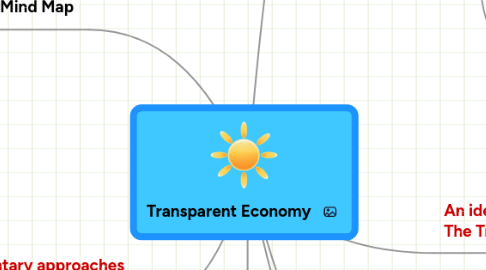
1. This Mind Map
1.1. is in the making
1.2. was created by some adhoc brainstroming
1.3. author: Willi Schroll schroll@strategiclabs.de http://strategiclabs.de/
1.3.1. http://www.linkedin.com/in/willischroll
1.3.2. other stuff from the author
1.3.2.1. Time to transform your company into an academy (blogpost)
1.4. the impulse came from reading a post of William Halal at shapingtomorrowmain.ning.com (August 31, 2009)
2. What Transparent Economy is not
2.1. Of course TE is no Big Brother scenario, with everyone knowing everything
2.2. Even today there are a lot of reporting compliances - by law or self-regulated.
2.3. There are cores of business like planning, strategy and intellectual properties, which have to be protected severely.
3. Complementary approaches and components
3.1. Collaborative Enterprise
3.1.1. William E. Halal and Elias G. Carayannis - Business collaboration could transform the economy | csmonitor.com http://www.csmonitor.com/2009/0806/p09s03-coop.html
3.1.2. Whole Foods ... has thrived under a philosophy that holds, "Profits are a byproduct of treating people well, not the top priority."
3.1.3. Nucor ... is one of the world's most successful steel firms because each mill team builds a cohesive culture based on performance and collaboration.
3.1.4. Johnson & Johnson ... continues to garner respect today by requiring its 80 small businesses to be self-managed.
3.2. Social Business and Social Entrepreneurship
3.2.1. http://en.wikipedia.org/wiki/Social_business
4. Mechanisms
4.1. social appreciation and reputation
4.1.1. these values are one of the strongest incentives
4.1.2. they have been neglected in the tradition of economics
4.1.3. always effective, still underscored
4.1.4. Successful exaples: Open source software, Wikipedia etc.
4.1.5. distractors, negative: deterrence, shame
4.1.6. attractors, positive: fame, creativity
4.2. Social Web
4.2.1. reputation systems
5. Exspected Results
6. Balancing Uber- Capitalism
6.1. The financial crisis was to some degree a result of reckless behavior
6.2. Lessons Learned: How "Organized Crime Economy" works
6.2.1. Core mechanism intransparency and silence
6.2.2. We can learn from the Mafia, how a civilized economy should NOT function
6.2.3. Analyzing and tracking a network means identifying the hidden power structures
6.2.3.1. related PDF
6.3. Uber-Capitalism as a crtical term means
6.3.1. We have to evaluate the core principles and mechanisms and then have to adapt according to the insights.
6.4. Balancing mono-value Capitalism
6.4.1. How can that be done?
6.4.2. How can pro-social values be strengthened.
6.5. There is something at stake. The wealth of nations and the future of the planet. We all have the right and the obligation to think about the bugs of the system.
6.6. Socialist utopia is falsified
6.6.1. History told us that socialism failed severely and many times as an economical, political and scientific system. The victims of the concept count hundred of millions. Lenin, Stalin, Mao etc. are falsified. The architecture was so wrong that the Sovjet Block collapsed by own weakness.
6.7. Saving the capitalist core
6.7.1. We stick to capitalism in lack of serious alternatives. The core idea of free subjects acting in free markets is still convincing.
6.8. Status quo
6.8.1. Today the sometimes para-criminal subject (e.g. investment banker) can hide in the organisation and often can count on the loyality of his peer group.
6.8.1.1. professional normative structures untouched?!
6.8.1.2. particularism - dominating values: self-interest and profits-first mindset
6.8.2. Remind the devastating results of greed in an untamed market economy
6.8.2.1. e.g. things like "China tainted baby milk scandal", 2008
6.8.2.1.1. Nearly 13,000 in hospital as China milk scandal grows | Reuters
7. An idea to change the game - The Transparent Economy
7.1. Let us complement the value chain of the monetary dimension with the reality of human nature.
7.2. Progress of technology (Moore's law etc.) enables us to communicate and collaborate on a level never seen before in history.
7.3. Transparency technologies with smart algorithms can realize an environment with components rewarding the moral decision and punishing the immoral decision
7.4. Wikinomics (Don Tapscott): How Mass-Collaboration changes everything.
7.5. I want to propose another component: Mass-Transparency
7.6. This idea is tempting, because it is based on a concept of self-regulation.
7.6.1. social values and behaviors become more visible and intrinsically regulate decisions
